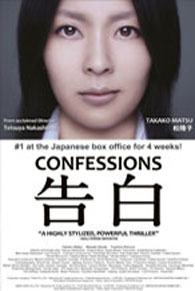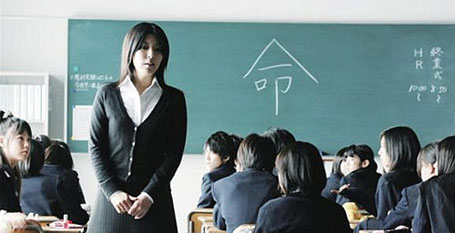
In the first half hour of Confessions, a high school teacher tells her rowdy freshman class of how her daughter was remorselessly killed by two of their peers. It is a crime without reason, enacted without passion. Dispassionately, to a room of fresh-faced teenagers who are only paying attention to her now because her tale seems interesting in a salacious kind of way, she explains who did it, how they did it, and why they did it. And then, announcing her retirement, she promises an exquisite revenge on the under-aged murderers; the justice system may acquit them, but not her.
The teacher’s revenge is slow in coming and its circuitous path (the story is narrated as a series of confessions by the principal characters, including the murders) is paved with many a red herring. It also gives the director a chance to reference many hot-button youth problems aside from minors committing murders, like school bullying (if an entire class relentlessly and joyfully persecutes the two murderers, is bullying still a bad thing?) and hikkikomori.
As with Kinji Fukusaku’s Battle Royale, there is plenty of violence and cruelty on screen from everyone. Nakashima depicts the violence in far more aesthetic manner here, setting the mayhem to music video imagery and soundtracks. Like a modern “torture porn” horror film, Confessions is something you can’t tear your eyes from once you start watching.
While Fukusaku’s film has a humanist core – one imagines the aged director motivated and horrified by the failure of society to protect its young – Confessions is a film made by a younger, more cynical director who sees no redemption possible.

